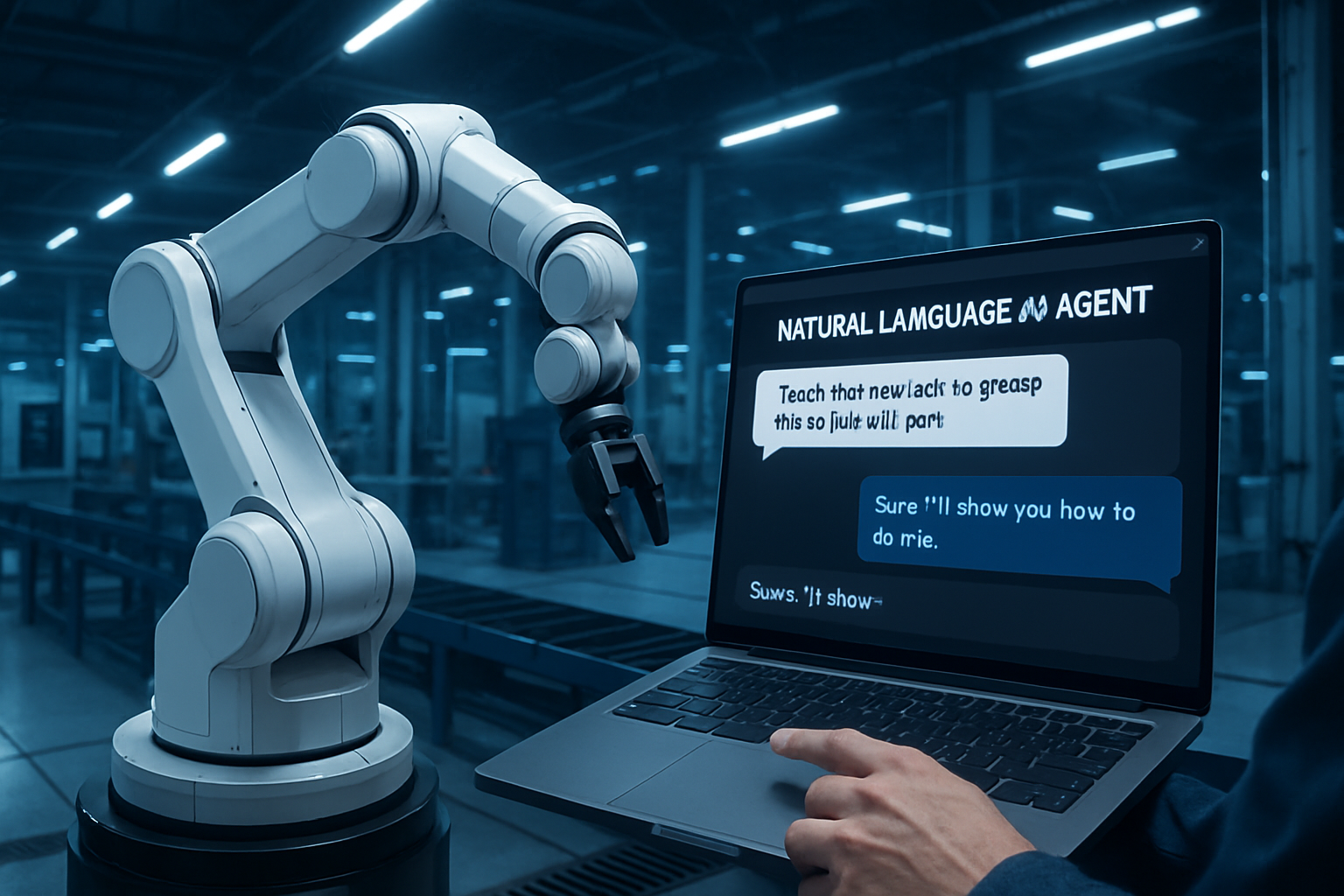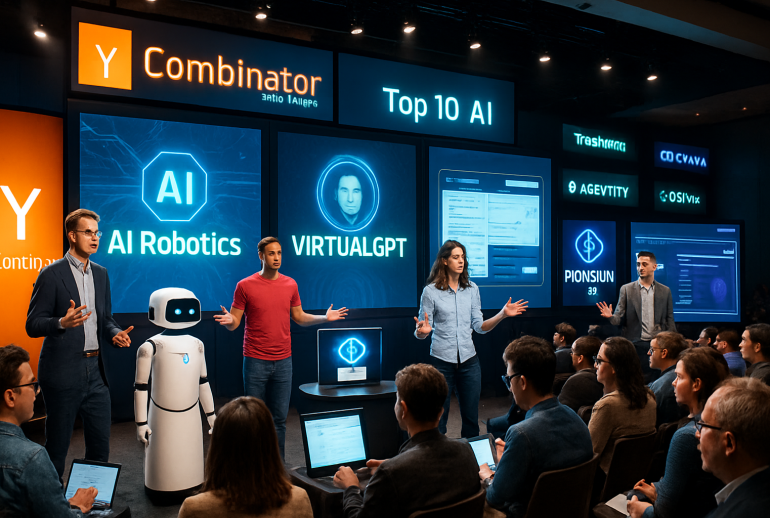Y Combinator’s inaugural spring 2025 cohort Demo Day marked a pivotal moment in the evolution of the tech startup ecosystem, spotlighting a remarkable surge in AI agent innovation. With nearly half of the 144 participating startups focusing on agentic AI technologies—software capable of autonomous thinking and task execution—the event encapsulated the accelerating trend of intelligent automation across industries. This groundbreaking batch, infused with fresh ideas from San Francisco to New York, introduced startups that blend cutting-edge machine learning with domain expertise, driving efficiencies and transforming user experiences in healthcare, fintech, manufacturing, and more.
The spring session, a new addition to Y Combinator’s usual biannual cycles, brought together entrepreneurs ready to disrupt traditional workflows by unleashing AI agents powered by firms like OpenAI, Cohere, and Stability AI. These startups received extensive mentorship and a $500,000 investment from YC, underscoring the accelerator’s strong commitment to nurturing AI-first companies. From firms like Galen AI, which integrates health records with fitness data to personalize wellness advice, to Mbodi AI’s natural language-based robot training solutions, the range of innovations demonstrated the broad potential of agentic AI not only to enhance businesses but also to redefine human-machine collaboration.
Among the top innovators, startups like Approval AI automate complex mortgage processes, while Casco pioneers AI-driven cybersecurity testing by simulating attacks on AI agents themselves, exemplifying how AI is both the tool and the target in evolving digital defenses. These selections represent diverse sectors and functions, signaling a new era where AI agents act as indispensable collaborators, not just assistants. As the competition intensifies globally, companies leveraging advancements from entities like DeepMind, Jasper, Copy.ai, and Adept aim to capture growing markets by delivering smarter, more adaptable solutions.
This report delves into ten of the most promising AI agent startups emerging from Y Combinator’s spring 2025 batch, highlighting their unique propositions, leadership, and potential impact. Whether improving productivity with Airweave’s AI-enhanced searchable databases or accelerating revenue cycles with Atlog’s voice agents in furniture rental, these startups exemplify future-facing innovations fueling the AI agent revolution. Detailed exploration of their models reveals insights for investors, industry professionals, and AI enthusiasts keen on understanding the drivers behind the acceleration of autonomous digital agents in today’s dynamic tech environment.
Revolutionizing Industries: The Impact of Y Combinator’s AI Agent Startups on Healthcare and Fintech
The healthcare and fintech sectors stand out as prime beneficiaries of the AI agent startups emerging from Y Combinator’s spring 2025 cohort. These industries, traditionally riddled with complex regulations and time-consuming processes, are witnessing transformational shifts via automation and intelligent AI integration.
Healthcare Innovations Driving Personalized and Efficient Care
Startups like Galen AI exemplify how AI agents are reshaping healthcare by connecting disparate data sources, such as electronic health records and fitness trackers, to deliver personalized health and wellness advice. This approach enables care providers to embrace a proactive stance, with AI agents processing hundreds of health indicators to suggest timely interventions. The founders, Priyanka Shrestha and Viraj Mehta, have created a platform that harnesses advanced machine learning models akin to those used by leading AI labs like OpenAI and Lumiata, fostering a comprehensive understanding of individual health profiles.
Another key player, Aegis, tackles a major pain point in healthcare billing: the insurance appeals process. Founded by Krishang Todi, Aarav Bajaj, and Dhanya Shah, Aegis automates the procedure for healthcare providers to appeal denied claims, dramatically increasing the win rate and reducing administrative burdens. This innovation utilizes AI agents to scrutinize complex insurance guidelines and paperwork, paving the way for swifter reimbursements and improved cash flow. Such efficiency could revolutionize healthcare IT by relieving providers of manual bureaucratic tasks.
- AI agents reduce human error in high-stakes healthcare processes.
- Automation shortens appeals timeframes, increasing provider revenue cycles.
- Personalized wellness advice enhances patient engagement through continuous monitoring.
| Startup | Focus Area | Key Innovation | YC Partner |
|---|---|---|---|
| Galen AI | Personalized Health & Wellness | Integrates health records with fitness data for AI-driven advice | Dalton Caldwell |
| Aegis | Healthcare Insurance Appeals | Automates denied insurance claim appeals process | Aaron Epstein |
These healthcare-focused startups are part of a broader AI revolution, with significant investments directed towards improving patient outcomes and operational efficiency. Emerging SaaS startups in related domains, as highlighted by recent market analyses, indicate that AI adoption in healthcare will grow exponentially, supported by innovations like Galen AI’s personalized models and Aegis’ backend automation.
Fintech Startups Simplifying Complex Financial Interactions
The fintech sector gains substantial advantage from agentic AI through startups such as Approval AI. Arjun Lalwani and Helly Shah’s creation optimizes the mortgage process as a mortgage co-pilot, automating entire workflows—from rate comparison and negotiation to finalizing paperwork. Its smart agents embed knowledge from financial regulations and market trends, mimicking diligence typically provided by human brokers or agents. By doing so, Approval AI reduces friction for consumers, streamlines lender workflows, and accelerates deal cycles.
With OpenAI’s natural language models combined with Cohere’s semantic understanding engines, Approval AI has created an intuitive platform helping users navigate complex financial decisions efficiently. This startup’s innovative use of AI complements ongoing trends where AI disrupts traditional financial services—trends examined deeply in reports like those discussing investment strategies in AI startups.
- Automated mortgage assistance reduces loan processing times significantly.
- AI-driven negotiation helps consumers secure better rates.
- Consumer finance portals integrate seamlessly with existing banking APIs.
| Startup | Product Focus | AI Application | YC Partner |
|---|---|---|---|
| Approval AI | Mortgage Process Automation | Co-pilot aiding rate shopping and paperwork automation | Pete Koomen |
Experts see such fintech AI agents as catalysts for democratizing finance and reducing barriers for underserved communities. Moreover, integration of AI with regulatory compliance parallels the approach of companies like DeepMind and Adept, which emphasize ethical AI deployment alongside innovation.

Transforming Business Operations: AI Agents Streamlining B2B Processes and Cybersecurity Solutions
Business-to-business (B2B) startups in Y Combinator’s spring batch harness the power of agentic AI to enhance operational efficiency, transform workflows, and bolster security. These startups illustrate the practical applications of AI beyond consumer-facing products, integrating deeply with corporate infrastructure.
AI Agents Enhancing Corporate Productivity and Resource Management
Airweave, co-founded by Lennert Jansen and Rauf Akdemir, offers an innovative solution that converts a company’s scattered productivity applications and tools into a unified, searchable database powered by AI agents. By turning inward-facing digital assets into intelligent repositories, Airweave enables companies to unlock corporate knowledge and accelerate decision-making, a crucial advantage in today’s data-saturated workplace. The integration capabilities parallel those of platforms by Runway and Copy.ai, known for leveraging AI to enhance creative and operational workflows.
Beluga Labs takes on another critical aspect of business operations—financial management for content creators. Using AI agents, Beluga Labs automates the organization of income and expenses while analyzing potential tax incentives. This approach simplifies accounting tasks previously considered tedious, offering a tailored fintech solution backed by AI models inspired by Jasper and Synthesia technologies. Founders Fernando Young and Jack Swisher focus on empowering creators to optimize earnings without the need for specialized financial expertise.
- Streamlined access to company-wide data amplifies productivity.
- Automated expense and tax management reduces human error and time.
- Custom AI agents adapt to unique organizational workflows with minimal training.
| Startup | Application Domain | Primary AI Function | YC Partner |
|---|---|---|---|
| Airweave | Data Infrastructure | Transforms enterprise tools into searchable AI databases | Aaron Epstein |
| Beluga Labs | Content Creator Finances | Automates financial record management and tax analysis | Dalton Caldwell |
Redefining Cybersecurity with AI Agent Technologies
Companies like Casco, founded by Ian Saultz and René Brandel, are pioneering the use of AI agents for cybersecurity by simulating attacks to uncover vulnerabilities within AI-driven systems themselves. This concept of “red teaming” at the AI level anticipates threat vectors unique to autonomous agents and machine learning algorithms, thereby helping firms build robust defensive mechanisms. Their approach is crucial in today’s climate where cybersecurity integrates deeply with AI advancements from giants such as Stability AI and Lumiata.
Casco’s technology enables businesses to identify weaknesses before malicious actors exploit them, significantly reducing security risks. This proactive testing highlights the synergy between agentic AI and cybersecurity protocols, which aligns with the pressing concerns facing industries relying heavily on AI systems.
- AI-driven penetration testing accelerates vulnerability discovery.
- Simulated attacks enhance defense strategies before real threats emerge.
- Integration with corporate AI infrastructure ensures continuous protection.
| Startup | Cybersecurity Focus | Unique Capability | YC Partner |
|---|---|---|---|
| Casco | AI Agent Security Testing | Simulates AI agent attacks to find system vulnerabilities | Dalton Caldwell |
Advancing Robotics and Industrial AI: Teaching Old Machines New Skills with AI Agents
The industrial sector sees profound innovation driven by AI agents capable of enhancing manufacturing and robotics. The spring 2025 YC cohort showcased startups that empower traditional hardware with new intelligence, expanding their functionalities without costly hardware upgrades.
Natural Language as a Medium to Train Robots: Mbodi AI’s Breakthrough
Mbodi AI, led by Xavier (Tianhao) Chi and Sebastian Peralta, offers a pioneering platform allowing companies to “teach” legacy robots new tasks using natural language commands. This innovation bypasses complicated coding and robotics programming by equipping AI agents with the ability to interpret human instructions and convert them into actionable robotic commands. Mbodi AI’s approach echoes the innovative spirit found in AI companies like DeepMind and Adept.
By enabling legacy industrial equipment to learn dynamically, Mbodi AI extends machinery lifecycle and lowers the barrier to automation adoption among manufacturers. This can substantially reduce costs and accelerate production lines’ adaptability in highly competitive markets.
- Natural language commands simplify robotic task programming significantly.
- Extends lifespan and usability of existing manufacturing equipment.
- Facilitates faster adaptation to changing production requirements.
| Startup | Sector | Innovation | YC Partner |
|---|---|---|---|
| Mbodi AI | Manufacturing & Robotics | AI agents interpret natural language to train legacy robots | Pete Koomen |
Open Source AI Agents Lower Barriers for Predictive Model Building: Plexe’s Contribution
Plexe is building open-source agents that create predictive machine learning models from natural language prompts. By making these tools accessible to engineers and product designers, co-founders Vaibhav Dubey and Marcello De Bernardi aim to democratize AI model creation. This initiative complements the booming trend of AI democratization fueled by companies like Cohere and OpenAI, which are central to the ecosystem’s rapid expansion.
Plexe’s low-code approach is set to revolutionize how non-expert users build and deploy AI, boosting productivity and fostering innovation across various industrial domains. This model reduces dependency on specialized AI engineers and accelerates time-to-market for AI-empowered products and services.
- Facilitates rapid, prompt-driven creation of predictive models.
- Supports engineers and designers with intuitive AI toolsets.
- Harnesses open-source collaboration to accelerate AI innovation.
| Startup | Focus Area | AI Solution | YC Partner |
|---|---|---|---|
| Plexe | B2B Engineering & Product Development | Open-source AI agents for predictive modeling via natural language | Nicolas Dessaigne |

Consumer-Centric AI: Enhancing User Experience with Voice Dictation and Automated Sales Calls
Agentic AI is not confined to behind-the-scenes industrial and B2B applications; it also revolutionizes consumer interactions through intuitive interfaces that streamline daily communication and processes.
Willow: Personalized Voice Dictation and Messaging
Willow, created by Allan Guo and Lawrence Liu, is a voice dictation app that replaces keywords with natural spoken words and employs AI agents to craft messages in a user’s personalized tone. This approach enhances communication by combining speech-to-text precision with adaptive language models similar to those developed by Adobe’s Runway and Jasper’s content generation engines. By anticipating user intent and style, Willow curtails editing time and boosts accessibility for users with diverse communication needs.
Atlog: AI Agents Revolutionizing Sales and Payment Calls in Furniture Rental
Atlog applies AI voice agents to manage sales and payment calls specifically for furniture rental companies, thereby automating and personalizing customer interactions. This B2B solution, founded by Vraj Parikh, John Bettinger, and Shaun Karakkattu, leverages advances in synthesized speech and conversational AI from leaders like Synthesia to create scalable, human-like phone interactions without human agents. By automating repetitive calls, Atlog enhances operational efficiency and improves customer satisfaction simultaneously.
- Voice-based AI reduces manual input for message composition.
- Automated calls free human agents for higher-value interactions.
- Personalization retains customer engagement despite automation.
| Startup | Consumer Focus | AI Application | YC Partner |
|---|---|---|---|
| Willow | Voice Dictation & Messaging | AI crafts messages in user’s tone from spoken words | Nicolas Dessaigne |
| Atlog | Sales & Payment Automation | AI voice agents conduct customer calls for furniture rental | David Lieb |
Investment Trends and the Future Outlook for AI Agent Startups from Y Combinator’s Spring Cohort
The influx of AI agent startups in Y Combinator’s spring cohort reflects a broader investor appetite and strategic focus on autonomous software development. Backed by a $500,000 investment per startup and guided with mentorship from YC’s seasoned partners, these companies are uniquely positioned to ride the wave of AI innovation while addressing real-world problems across diverse sectors.
Market Dynamics and Strategic Investment Focus
Investors increasingly prioritize AI startups that not only demonstrate technological novelty but also possess scalable business models and clear paths to monetization. Startups like the ones featured in this batch resonate with trends emphasizing AI’s role in automating repetitive tasks, enhancing decision-making, and boosting operational efficiency. Articles such as AI startups coding valuation insights show how funding patterns are evolving to reward technical sophistication alongside tangible market traction.
Emerging SaaS startups in this ecosystem, as covered in related market reports, benefit from increased visibility and collaboration opportunities, especially when integrating AI capabilities inspired by global leaders like Stability AI and DeepMind. In addition, startups are exploring partnerships with larger platforms such as Synthesia and Jasper to embed AI functionalities into mainstream products, thereby accelerating adoption and user base growth.
- Strategic investments focus on startups with cross-industry applicability.
- Collaborations between new ventures and established AI firms amplify capabilities.
- Scaling beyond early-stage development requires robust AI infrastructure.
| Investment Criteria | Rationale | Outcome |
|---|---|---|
| Technological innovation | Distinguishes startups in competitive AI markets | Increased investor confidence and funding |
| Scalable business model | Ensures sustainable revenue generation | Long-term market relevance |
| Cross-sector applicability | Expands potential markets | Diversified growth opportunities |
Looking ahead, Y Combinator’s first-ever spring cohort has set a powerful precedent. Their focus on agentic AI aligns with a global renaissance in autonomous software, powered by advances from companies like OpenAI, Cohere, and Adept. Entrepreneurs drawn to this technology must navigate a complex landscape—balancing innovation, ethical AI use, and market demands—to unlock the unicorn potential of AI-driven startups, a topic well examined in recent industry analyses.
Frequently Asked Questions About Y Combinator’s AI Agent Startups and Their Industry Impact
- What exactly is agentic AI, and why is it significant in 2025?
Agentic AI refers to intelligent software capable of autonomous decision-making and task execution without constant human guidance. Its significance lies in enabling rapid automation across sectors, improving productivity and creating new market opportunities as seen in the diverse YC startups. - How does Y Combinator support early-stage AI startups differently in its spring cohort?
The spring 2025 cohort was YC’s first in this season, designed to accelerate innovation by providing $500,000 investments, mentorship, and focused opportunities to scale AI technologies in less-than-six-month timeframes, reflecting the fast-moving AI landscape. - Which industries show the most growth potential for AI agents?
Healthcare, fintech, manufacturing, cybersecurity, and B2B operations show robust growth potential, as exemplified by YC startups like Galen AI, Approval AI, Mbodi AI, and Casco. - How do AI startups collaborate with larger AI entities like OpenAI or Stability AI?
Many YC startups leverage APIs, data sets, and frameworks provided by these AI giants to build specialized solutions, accelerating product development and enhancing performance. - What challenges do AI startups face in scaling agentic technology?
Challenges include managing data privacy, maintaining ethical AI practices, ensuring accuracy, and building scalable infrastructure. Overcoming these is essential to long-term success and investor confidence.


